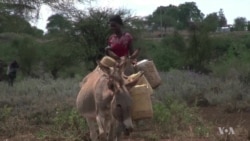Sixteen million Kenyans lack access to safe drinking water. Sixty percent of rural folks remain off the water grid. In Kenya's Kajiado province, an initiative is enlisting local women to try to fill the gap.
Kajiado gets little rainfall. The Kenyan capital, Nairobi, is 125 miles away from Esther Kume’s homestead. The mother of nine has to buy 10 jerry cans of water a day from local businessmen. Even then, she says the water isn’t always safe to drink.
"We have to go as far as 10 kilometers to reach water since there are no rivers around. That’s why we are forced to buy water. When we hear of anyone selling water, we have no choice but to buy,” she said.
'Ekocenters'
AficAqua, in partnership with Coca-Cola and water.org, has been setting up these "ekocenters” around East Africa since 2014 to provide safe drinking water. The centers get water through boreholes. They use solar power and a purification technology called reverse osmosis.
Cabinet Secretary for Water and Irrigation, Eugene Wamalwa, says misappropriation of funds in his ministry has kept so many rural Kenyans off the state water grid.
“I have told them in no uncertain terms there will be no sacred cows and coming into a ministry that was one of those affected by the clean-up his excellency the president led, we have said we are not going to go back to the ways of the past, the ways of corruption,” said Wamalwa.
Bringing water to customers
The county digs public boreholes but residents must still trek many kilometers to reach them. This newly opened ekocenter has 15 employees who will deliver safe water by motorized rickshaws, known as tuk-tuks. The 20-liter can sells for 50 cents.
“The challenge of the cost to the customer is actually not very high because what we do, they can pay this into installments. We don’t tell them that you have to do it that particular day. You can do it in installments until the other time you are refilling,” explains Joyce Nduta, water manager at the ekocenter.
This new ekocenter hopes to serve around 3,000 residents and plans are underway to replicate the initiative in other areas.





